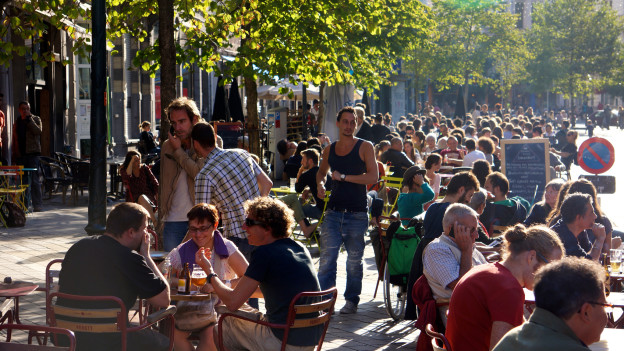In collaboration with Anthony Zacharzewski – Translated and reposted from CheFuturo
European leaders have a deal with the Turkish government. It works like this: Syrian refugees cannot go on from Greece into other EU countries. We are sending them back to Turkey instead. For each one we send back, we pick another from Turkish camps and admit her to Europe. Turkey gets a revamping of its EU accession talks, easier visas for Turks coming into Europe, and money. But what does Europe get in return?
Not much, it seems. Policy experts think the one-for-one scheme is unworkable. The Greek state, understaffed after years of austerity, does not have the capacity to deliver it. Aid agencies think it is “inhumane“. The UNHCR questions the credibility of the safeguards intended to protect vulnerable asylum seekers. European diplomats expect the deal to be brought before the European Court of Human Rights in Strasbourg. Traffickers will likely see an increase in their grim business.
Chances are the scheme won’t work. And if it did, it might make things worse. Not just for those who crossed desert and sea to get stuck in Greece. For Europeans too. Economists have long done the maths and shown that migrants are net contributors to European welfare states (survey). Migrants are on average younger, more educated and more entrepreneurial than natives. For all their disadvantages, Syrians managed to start 415 companies in Turkey in the first two months of 2016. Without migrants, our aging population would soon be unable to support itself (source). Immigration is good for growth, which is why business leaders want more of it.
So, EU leaders have locked themselves in an unworkable deal and a humanitarian disaster. In so doing, they also crippled their own economies. What’s going on here?
The easy answer is: politics. With twenty years of steady growth suddenly brought to a stop and in many places put into reverse, Europe has spawned populist parties – often ethnic nationalists, always anti-government and anti-EU. They target the disgruntled, those who have lost out from the new high-education, high-skill jobs market. The populists draw on resentment, but offer no real change – just the simple, clear and wrong solution to each country’s problems: stop the migrants!
Economic crisis has brought these parties to prominence, but economic growth tomorrow would not cause them to wither, because they draw their real strength from a deeper problem: we have allowed ourselves to forget what Europe is about.
Europe was never about standards – though they support innovation and growth, and give consumers and business confidence. Standards are just a tool to develop the European single market. And the single market itself is just a machine designed to prevent war.
Europe is about peace. Peace initiatives have happened before, but the European Union is self-reinforcing. Over the decades, EU institutions have enabled, and we the people have built, a dense web of relationships. First it was international trade; then education (Erasmus, anyone?); then business partnerships; then thousands and thousands friendships and marriages. War has become unviable, unthinkable.
This was never meant to stop at our borders. Peace and prosperity through trade is also our foreign policy. Countries at our borders like that, so they want in. And we obliged, letting more and more countries in. We wisely invested in the less developed ones, using European funds to upgrade their infrastructure. They rewarded us by blooming into prosperous countries, with solid middle classes eager to buy German cars, Italian design, British financial services. Ireland, then Spain, then Estonia, then Romania.
The caravan still rolls on, beyond Europe’s present borders. The Balkans were at war only twenty years ago. Now they are at peace, and getting prosperous. They like us there, and we like them back. We are good neighbours. We fund highways, libraries and public buildings at a fraction of what a military presence would cost. We have prestige and influence. We can navigate the region speaking English, German, Italian. We can pay in euro everywhere. All countries are getting in the accession queue.
Everybody aspires to be us, because peace, upholding human rights and free trade work. Gun-toting nationalistic empires don’t. Ask the Ukrainians: they could be part of the last old school empire in Europe, Vladimir Putin’s Eurasian Economic Union. But they appear not to want to. When their president signed a treaty with Russia in 2014, they staged a revolution, kicked him out of the country and organised citizen militias to fight pro-Russia paramilitaries in the East.
It’s not just Serbians and Ukrainians. It’s Syrians, Tunisians, Eritreans. Whatever their countries do, people aspire to being a part of our project. This is what Europe is all about; this is our legacy. We are the only polity in the world to have renounced violence and uphold mutual understanding as the way forward. Even at these times of crisis, we are a beacon of hope for humanity.
And that brings us to Brexit. Those uncomfortable Europeans, the British, are going to be asked on 23 June whether they want to stay in the EU or not, and the answer is far from certain. As with those trade links, those Erasmus studies, those romances, Brexit reaches into every part of Europe – all the more effectively because it is taking place in Europe’s most-spoken language.
Much of the debate has been awful, from both sides. The supporters of Britain’s place in the EU seem to have no arguments beyond money, jobs and finance – important, but not enough to make the case for Europe’s wider ambitions and possibilities. Reassurances of the Remain campaign today close off any future development of the UK’s relationship with the EU. Their argument is “vote for Europe, because our Europe has no Schengen, lots of opt-outs, and absolutely no Euro”.
On the other side, the Eurosceptic press are dominated by anti-immigrant populism, and a desire to go back to some imagined time of national unity, monoculture and full employment. Mainstream politicians on the Leave side cannot acknowledge that medium sized nation states have no power in the modern world, so they have have had to construct unrealistic futures, where Britain prospers by slashing regulation, or by creating free trade deals with its former empire, or just by getting those Europeans to do what the Brits say.
This is an attempt – who knows how successful? – to rationalise around an emotional reaction – a love for Parliament, for British democracy, the ‘thousand years of British history’ which a former Labour leader thought the EEC would put to an end. Sovereignty, democracy and national power are slippery concepts. The dry world of European summits and compromises might be more effective power but it is not more romantic power.
The default of the Brussels bubble is to believe that Europe will get there in the end. In mid-euro-crisis, a European politician said “we all know what we have to do, we just don’t know how to get re-elected once we’ve done it”. As time has passed, that politician is President of the Commission, governments around the continent have changed – but the Euro remains. Maybe in five years the migration crisis and Brexit will be in the same place – not solved but not quite so present, a memory of a panic.
Maybe not. There is a saying that companies go bankrupt at first slowly, then all at once. Look around Europe and the signs are there that the structures are weakening, the institutions becoming hollowed out, as they are with national politics.
But in that romantic love of the Brexiters, there is an answer to the problem of European politics, and not just in Britain. We have to make Europe something that can be believed in again – not with an emotional allegiance, but as a shared project of construction, based on those principles of freedom, openness and democracy.
You can’t do that by decreeing a European nationalism, commanding a tear in the eye as Ode to Joy plays. Some people feel that now, more may feel it in the future, but it can’t be invented. Instead the connections and the networks of Europe should be celebrated as success not denigrated as failure.
If we fail to do that, what else can we Europeans do? Well, we could follow the lead of the Brexit camp, and focus on being just 28 more nation states. Doable, maybe. But we would be second-rate nation states. Too small. Too old. Too petty. Plagued by low growth, high debt, an ever more aging population, and populist, rancorous politics. A backwater in the coming Asian century.
A peaceful continent for us all to roam freely is our gift the world, what makes us unique. Politicians in the UK and elsewhere, when they talk of breaking this down, or restricting its scope, might gain some short-term consensus and media visibility. But they are gambling with our souls.
Photo: Malachy Browne: murales at The Jungle, a semi-official refugee camp in Calais (France)


